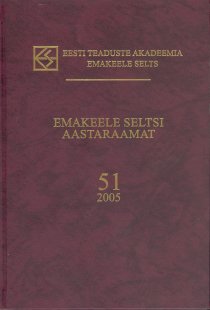Mõne eesti keele kaubandusalase sõna päritolust areaalsel taustal
About the Origin of Some Estonian Trade Terms against the Areal Background
Author(s): Sven-Erik SoosaarSubject(s): Language and Literature Studies
Published by: Eesti Teaduste Akadeemia Kirjastus
Keywords: Comparative linguistics; etymology; etymological dictionaries
Summary/Abstract: The article compares the origin of Estonian words denoting the concepts PRISE ‘hind’, COMMODITY ‘kaup’, PAY ‘maksma’, SELL, ‘müüma’, BUY ‘ostma’, and MONEY ‘raha’ with the origin of the same words in neighbouring and genetically related languages. Trade vocabulary reflects close multilateral contacts between the peoples as well as their environment and history. For example, the words denoting MONEY ‘raha’, show that northern peoples used furs (mostly squirrel furs) as a measure of the value of the commodity and a replacement for money while cattle-raising southern peoples used cattle for this purpose. It is fully possible that in the early days of agriculture also grain served as a measure of value, as the Estonian word hind ‘price’ and its Mari and Khanty equivalents.
Journal: Emakeele Seltsi aastaraamat
- Issue Year: 2005
- Issue No: 51
- Page Range: 138-147
- Page Count: 9
- Language: Estonian

